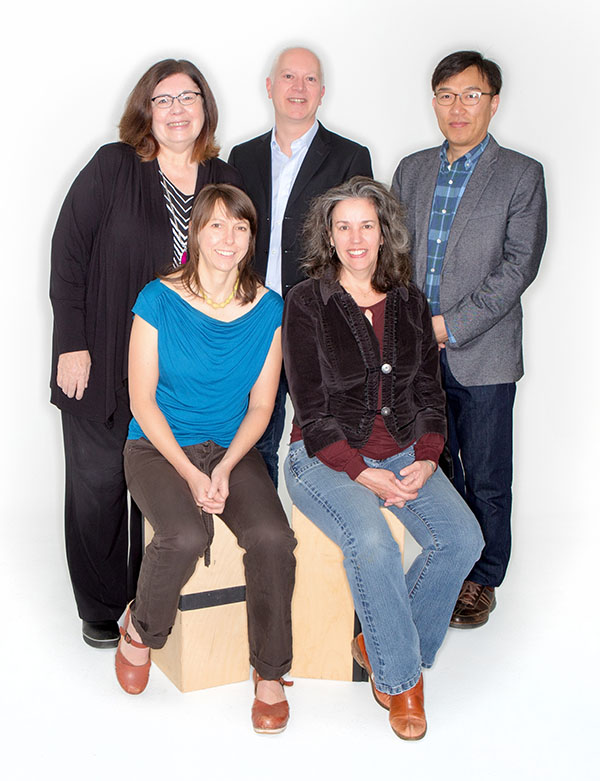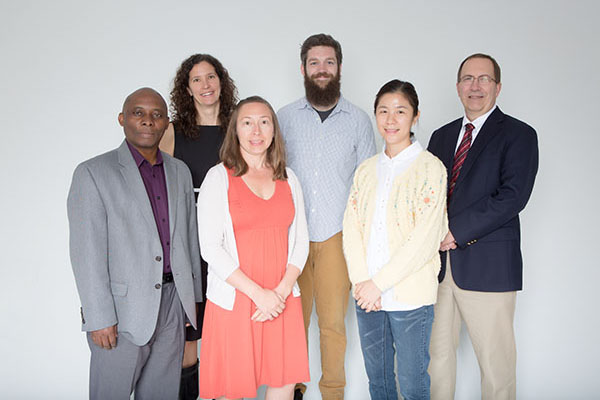BOONE, N.C.—Five proposals out of 40 submitted by faculty at Appalachian State University have been awarded funding through Chancellor Sheri N. Everts’ Appalachian Innovation Scholars Program (AISP).
Each of the scholarship proposals awarded reflect one or more of the university’s strategic initiatives: sustainability in the areas of economics, equity and the environment; diversity; student research; global learning; wellness and safety; and community and civic engagement.
The winners are Dr. Anne Fanatico, associate professor, Department of Sustainable Development, with collaborator Dr. Jeremy Ferrell, assistant professor, Department of Sustainable Technology and the Built Environment; Dr. Kyle Thompson, senior lecturer in nutrition and dietetic internship director, Department of Nutrition and Health Care Management; Dr. Paul Wallace, associate professor, Department of Leadership and Educational Studies, with collaborator Dr. Louise Keegan, Department of Communication Sciences and Disorders; Anna Ward, Scholars with Diverse Abilities (SDAP) director, with collaborator Erich Schlenker, manager, Transportation Insight Center for Entrepreneurship; and Dr. Ok-Youn Yu, associate professor and interim assistant chair, Department of Sustainable Technology and the Built Environment, with collaborators Hei-Young Kim, research assistant, Appalachian Energy Center, and Ferrell.
The AISP was initiated to complement other innovation initiatives at the university, such as those offered through the Research Institute for Environment, Energy, and Economics (RIEEE), Office of Sustainability, Office of Research, AppLab, Integrative Design Experience (IDEX), Transportation Insight Center for Entrepreneurship and others.
Some of the funded projects build on existing research; others are new initiatives. The awardees have up to two years to spend the allocated funds.
“Our first Innovation Scholars projects are stunning examples of original thinking and collaboration,” said Everts. “The number and quality of applicants far exceeded our expectations – we could have funded all 40 proposals with confidence. We actively will seek additional resources in order to fund this type of creative scholarship on a regular basis.”
Soon after the $10,000 scholarships were awarded, the director of RIEE and dean of the College of Arts and Sciences requested and were granted permission from the scholarship committee to fund an additional four awards at the $5,000 level.
About the projects
Fanatico and Ferrell propose to develop full-circle technologies in urban agriculture to extend year-round local food production in the Sustainable Development Civic Garden (formerly The Edible Schoolyard outside the Living Learning Center) and to further nutrient reclamation of organic waste. Elements of the project – greenhouse optimization for cold-hardy crops, thermal inputs, community food donations, consultation with area farmers and black solder fly larva research – will support sustainability initiatives and provide opportunities for interdisciplinary work, student research and outreach as well as university organic waste management.
Thompson proposes to develop an interprofessional simulation education model designed to prepare health professions students to appropriately recognize and respond to patient nutrition issues as members of primary care teams operating in rural settings. Thompson notes in her proposal, “Rural populations face barriers in accessing cost-effective, culturally appropriate health care services… Previously developed simulations address common aspects of rural culture, including rural poverty, food access and food insecurity, rural health beliefs and traditional foods. Better nutritional awareness and care could result in substantial progress toward achieving better care, better health and lower costs for underserved rural patients.”
Wallace and Keegan’s project, the development of socially assistive robotics (SAR) for traumatic brain injury rehabilitation, education and outreach, will support interdisciplinary faculty and student research, develop curriculum and new courses in the field of social robotics and artificial intelligence (AI), provide outreach to community organizations and seek external funding to support further research. SAR is a new field of robotics and AI that focuses on developing machines capable of interacting with humans for the purpose of providing assistance and achieving progress in convalescence, rehabilitation, training and education.
Ward and Schlenker will work toward creating micro business opportunities for students and alumni with intellectual and developmental disabilities. Specifically, SDAP, the Walker College of Business and students from the Association of Student Entrepreneurs (ASE) will collaborate to launch Creative Unbound, an ecommerce platform to showcase artists with diverse abilities from SDAP, reproduce their artwork on various products and sell the products online. The goal is to have the project up and running by spring 2017 and self-sufficient by 2018. This interdisciplinary project provides opportunities for community engagement, combines business with the arts and promotes social equity for underserved members of the community.
Yu, Kim and Ferrell propose to build on research around an existing affordable biomass heating system for greenhouses developed by the Biomass Energy Research team – called Nexus – currently under study on two local farms. They propose to test a root zone heat distribution system considered to be more energy efficient than space heating. Research around the biomass-heated greenhouses was initiated in 2015 to address the demand for local food that exceeds the supply due to shorter growing seasons in the area’s rough mountainous terrain and often-frigid winter weather. Biomass energy generated from all available on-farm feedstock such as livestock manure and agricultural, wood and food waste can be an affordable energy source. The root zone distribution system will enhance the efficiency with measurable benefits to the farmers in terms of longer growing season, the community in terms of increased local food supply, and the local environment in terms of fewer fossil fuel emissions.
“Each of these outstanding projects combines the pioneering spirit of our university with the core values of scholarly excellence, leadership and service,” Everts said. “The Appalachian Innovation Scholars Program was designed to leverage faculty and staff expertise and leadership, student passion and creativity and community engagement to spark innovation and change the world.”
Proposals were due to the review committee in January and the winners were announced in late February. The selected projects met the general criteria set by the scholarship parameters. As outlined, project approaches and results might include, but are not limited to:
- research that leads to innovative thought within a discipline;
- the development of new classes;
- campus events that promote innovation;
- student engagement experiences that build community and support creative and data-based approaches to arrive at solutions;
- design initiatives that address a campus, community or societal challenge; and
- partnerships with town, county, state, national or international partners.
Members of the review committee were: Dr. Nicole Bennett, RIEEE director; Hank Forman, acting chief of staff; Dr. Brian MacHarg, director, Academic Civic Engagement program, University College; Dr. Lee Ball, sustainability director; Erich Schlenker, Transportation Insight Center for Entrepreneurship manager; and Dr. Alan C. Utter, interim vice provost for research.
The funds for the AISP came from a one-time gift to the university and awarded at the chancellor’s discretion.
About Appalachian State University
As a premier public institution, Appalachian State University prepares students to lead purposeful lives. App State is one of 17 campuses in the University of North Carolina System, with a national reputation for innovative teaching and opening access to a high-quality, cost-effective education. The university enrolls more than 21,000 students, has a low student-to-faculty ratio and offers more than 150 undergraduate and 80 graduate majors at its Boone and Hickory campuses and through App State Online. Learn more at https://www.appstate.edu.
What do you think?
Share your feedback on this story.













